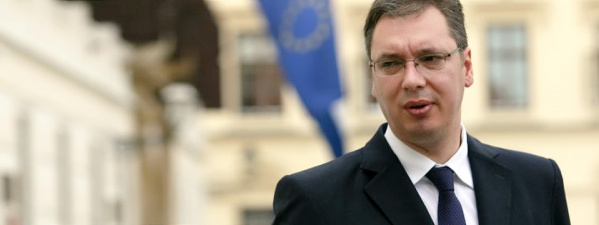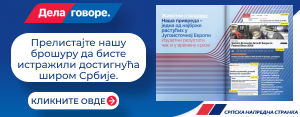
Vucic: Serbia is poised for a new future
A 19th Century American theologian and anti-slavery campaigner once wrote: “A politician thinks of the next election; a statesman of the next generation. A politician looks for the success of his party; a statesman for that of his country.”
James Freeman Clarke’s words are close to my heart, and he would doubtless have had stirring opinions on recent events in south eastern Europe.
As the international community continues to struggle with the situation in Ukraine, slightly to the west, Serbia has undergone a quiet but fundamental political transformation.
On March 16, we held our parliamentary elections and the results reflected a new evolution in Serbia’s democratic history. They showed that our whole nation is now united behind a new vision – a Serbia at the heart of Europe.
With strong leadership backed up by the mandate of the Serbian people and brave decisions, we are poised for a leap into a new and exciting future.
This Government is under no illusions about the scale of the task facing us, but we will not lose sight of our goals.
Our first priority is the economy. With the necessary reforms, Serbia can once again become a regional leader in industry and agriculture as well as a fruitful destination for foreign investment.
We will put maximum effort into fighting unemployment to offer a real future to Serbia’s talented, hard-working and dedicated people, getting our public finances onto a sustainable footing and creating a better environment for investors and entrepreneurs.
Lazar Krstic remains our finance minister and will continue his policies of balancing the state budget and putting Serbia’s irresponsible fiscal legacy behind it. The proposals have already won the support of the IMF and the global financial community and we will ensure they are realised.
There will be tough decisions along the way. We will have to curb our more generous public sector salaries and introduce pay grades to provide the same pay for the same work.
We are also in the middle of a significant national privatisation process to improve our government’s involvement in the economy. Where companies remain in full or partial state ownership, management will be professionalised and reporting and transparency will be brought in line with best international practice.
Through these measures, we aim to reduce the budget deficit to 3 per cent by 2017, which would bring Serbia in line with the best international examples available.
However, fiscal stabilisation is only one part of the solution. The country also needs growth.
No fewer than 21 changes to the law are already underway to improve the conditions for economic investment. Our reforms will include a new, more flexible labour law, a “one-stop shop” for formerly hard-to-get administrative permits, and a revamped bankruptcy code to provide the financial services sector with the certainty it needs when offering loans.
Serbia will be well and truly “open for business” over the next four years: better regulation will boost activity across the economy; foreign investment will bring in new skills, expertise, and market access; government incentives will help fledgling businesses become competitive; and companies of all sizes will be able to take advantage of strong trading relationships with Russia and the EU.
Victory over corruption is key if we are to attract the foreign investment necessary to build a better future for Serbia and I hope my stance on corruption can be in no doubt. No one is untouchable and everyone is equal before the law. No one will ever be able to get rich at the expense of the state and the citizens – and we are already putting the initiatives to ensure this happens into place.
Some of the biggest international businesses are giving Serbia their vote of confidence. Microsoft, Fiat and Coca-Cola and others are already flourishing in Serbia. Mercedes is developing its ties with Serbia’s Ikarbus. The United Arab Emirates sovereign fund Mubadala has signed memorandums of understanding on potential investments in semiconductor facilities, data centres and aerospace manufacturing.
But we will not stop there. I want to see Serbia become once again one of the great crossroads of Europe.
Geographically, we are already there: on the Danube, the river which links more European countries than any other, and on the main road link between Europe and the Middle East. Our electoral victory now provides us with the mandate to implement the wide-ranging reforms needed to secure Serbia’s rightful place as a full member of the European Union.
The changes will not just be economic. In charting a new future for Serbia, we have to put a difficult past behind us and address one issue that touches a particularly raw nerve for many Serbs – the relationship with Pristina. We have already made real progress, sitting down at the negotiating table with Hashim Thaci to end a long-running impasse.
The agreement with Pristina signed last April was a real breakthrough and has paved the way for the opening of Serbia’s EU accession talks earlier this year. I will continue to play an active part in this process.
By 2020, we aim to finalise EU negotiations. Some say this is optimistic but we know Serbia has what it takes.
We have the talent, the potential and the determination to tackle the challenges facing us. Economically, we are ideally placed to build on recent growth. Politically, the pace of change has never been faster.
A new, modern Serbia is ready to play a full part in Europe to the benefit of all. Had he been witness to the progress in Serbia, I think James Freeman Clarke might have approved.
Financial Times, 29.04.2014

